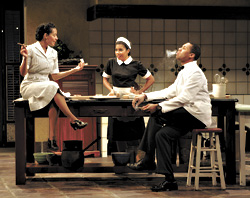Eduardo Machado’s life and work resemble that Cuban dish Moros y Cristianos (Moors and Christians), a tasty blend of contraries: rice, beans, and whatever’s lying around the kitchen. When Castro confiscated the Machado family’s money, Eduardo fled at age 8 to the United States, where he bounced between New York and L.A., hetero marriage and gay life, agitprop melodrama and Desilu’s 1960s sitcom style.
His plays about the Cuban-American experience are most influenced by his mentor, María Irene Fornés, whose work is (partly) redeemed from shapelessness by vivid characters and a lively political conscience. Machado’s similar mix proved a recipe for disaster when he got what should’ve been his big break—the Mark Taper Forum’s 1994 Machado marathon (the third biggest in the Forum’s history, after Angels in America and The Kentucky Cycle). Before the opening, an L.A. mugger threatened to kill Machado if he didn’t hand over the computer disks with the scripts. The playwright refused and survived. But most critics murdered the show for its inept storytelling sprawl; his vast career capstone crumbled.
And yet Machado kept working, and now his flavorful show The Cook is a smashing success at the Rep and elsewhere. His drifty-plotting problem is solved by a firm focus on Gladys, a racially mixed chef of genius, who’s devoted to Adria, the white plutocrat who hired her at 13. As Machado notes in his new memoir, Tastes Like Cuba: An Exile’s Hunger for Home, the lead character is based on a real Gladys he met in Havana in 2001. The woman ran a restaurant in a private home, where she’d been employed before the owner fled Castro.
The first scene is tensely set on New Year’s Eve 1958, the night Castro won and dictator Batista blew town at midnight, like a thug Cinderella. Machado’s milieu reeks of authenticity—his family had a New Year’s party that night, too—and Mikiko Suzuki MacAdams’ set makes us feel right at home. Gladys’ kitchen is snug and soaring, with a rough-beamed ceiling and a scuffed-yet-elegant, spiral wrought-iron staircase.
As Gladys, Zabryna Guevara is call-all-your-friends good. You may have glimpsed her in small parts on Law & Order or The Sopranos, but she can hold a show all her own. She girlishly flirts with her thick, macho husband, Carlos (Al Espinosa), for whom she’s wangled a chauffeur’s job (which he imperils by munching hors d’oeuvres he’s supposed to deliver to the 72 guests in the next room). In hard moments, her brow furrows with the gravitas of Anna Deavere Smith, but her beauty more often recalls Jennifer Lopez—all confident calm, only with an intelligent integrity beyond J.Lo’s ken.
All the actors do well with Machado’s bright, bantering dialogue. They also pull off his more ideologically freighted lines, a trickier feat. When Adria responds to her cook’s fond words by saying, “If it weren’t for the fact that you work for me, we could be friends,” Yetta Gottesman saves the role from crude cartoonishness by making Adria a sinister ditz with no clue she’s cruel.
In the second act, set in 1972, Adria’s gone and Carlos is a strutting Fidel official whose clout has won them the right to live in Adria’s mansion. He tells Gladys he’s entitled to marry a younger woman (as the playwright’s dad did). “You cheat on me with someone younger and I’m supposed to think that’s revolutionary!” snaps Gladys. Few actors could make us buy this line. Guevara sells it. And the women in the Rep audience had particular fun applauding such moments.
In Scene 3, it’s 1997. Russia has quit giving Cuba money, but the U.S. has kept the impoverishing embargo, thanks to all the Adrias in exile in Miami, critically voting Republican. So Carlos is living on a crummy pension, and Gladys saves the day by starting the restaurant. Guevara and Espinosa age brilliantly, as does the set, and they’re convincing old marrieds, bickering inseparably, despite (or maybe because of) Carlos’ love child living with them (the tangy, sassy Jessica Pimentel). When Adria’s very American daughter shows up, Gladys finally gets the chance to offer Adria’s family back the place she’s cared for all these decades, just as she’d promised the night Adria put on her mink coat and escaped.
The final confrontation expresses both sides of the playwright’s experience: the exile’s grief and deracination, the bitterness of loss, and the sympathy for the formerly oppressed.
Not everything in the play works. Machado creates an extraneous subplot about Gladys’ gay cousin, Julio (finely portrayed by A.K. Murtadha), whom she hides from Fidel’s homophobe goons. Perhaps Machado is working out deep personal material here. His family also sheltered a cousin; and had Machado grown up gay in Cuba, he might’ve been a fugitive, too. Julio is worth his own play, but he’s shoehorned into this one, a tangential political sermonette.
Still, The Cook is a sizzling concoction. Even its TV-ish and heavy-handed elements work, because history’s chilling shadow falls across them, giving them depth. It’s like a visit to a forbidden country.








